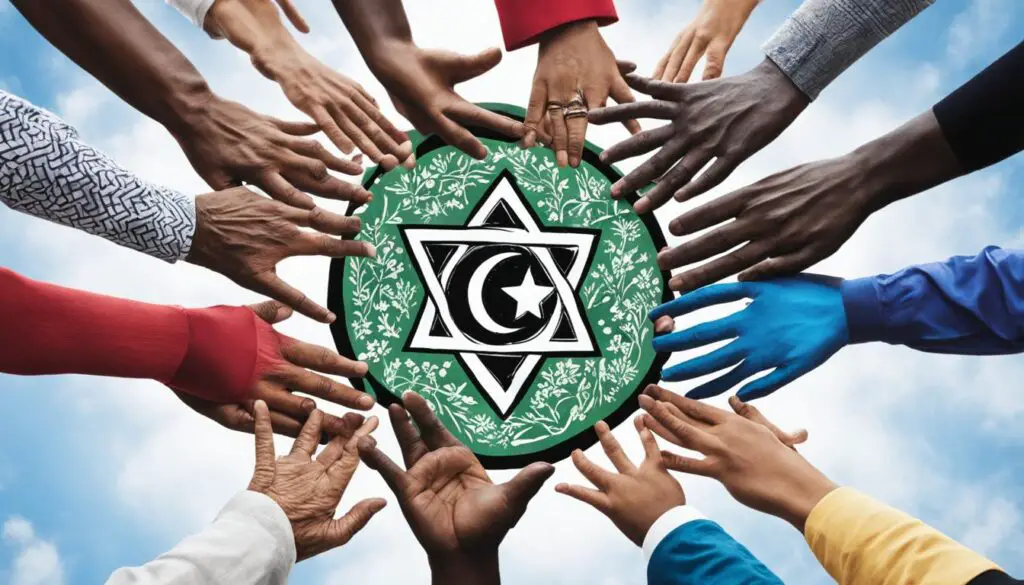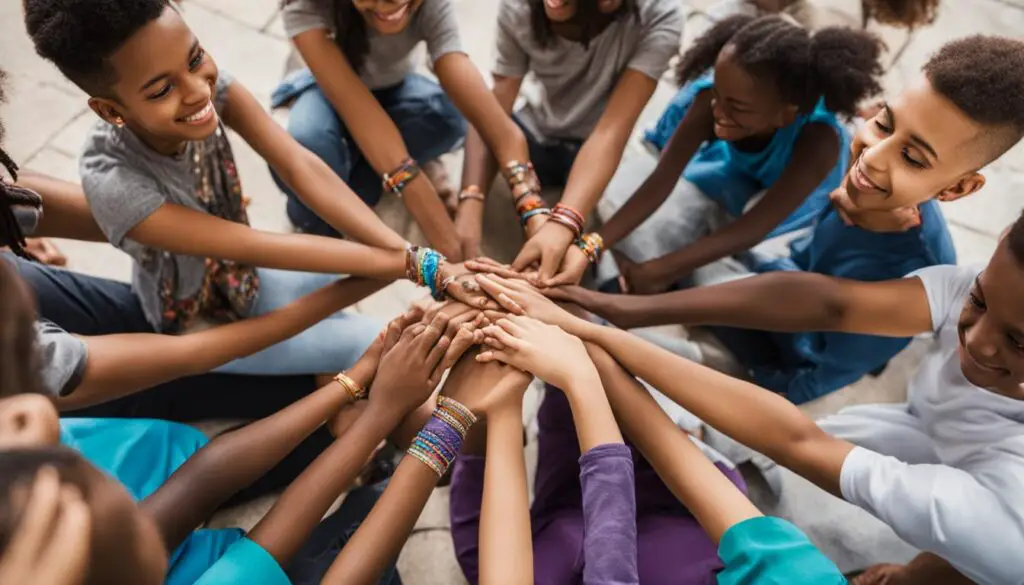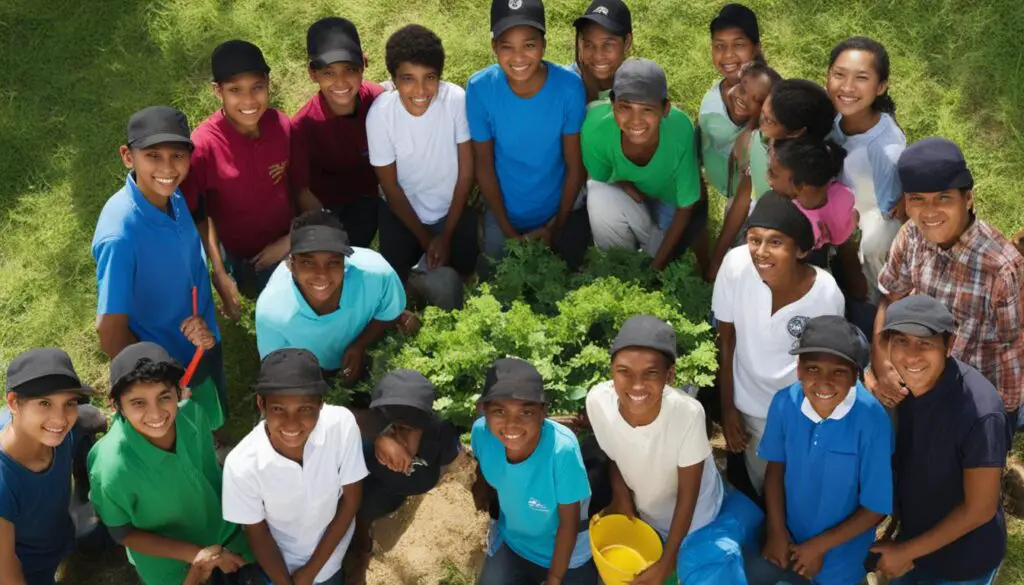Interfaith activities play a crucial role in promoting youth social awareness and fostering understanding and cooperation among diverse communities. These activities bring together people of different faiths and beliefs to build relationships, promote dialogue, and work together for the common good. Interfaith activities are essential in creating a society that values trust, respect, and cooperation among people of different faiths and beliefs.
Key Takeaways:
- Interfaith activities bridge the gap between diverse communities and promote understanding.
- Engaging in interfaith activities helps young people develop social awareness and empathy.
- Interfaith dialogue and cooperation contribute to positive social change.
- Interfaith activities in education foster religious literacy and cultural sensitivity.
- Supporting youth leadership in interfaith activities cultivates the next generation of interfaith leaders.
What is Interfaith Activity?
Interfaith activity is a dynamic process that brings together individuals from diverse faiths and beliefs to foster understanding, dialogue, and cooperation. Through engaging in meaningful conversations, participants aim to uncover common ground, appreciate differences, and nurture a spirit of mutual respect.
In interfaith activity, dialogue serves as the cornerstone for building bridges across religious divides. It provides a platform for people to express their perspectives, share insights, and explore the complexities of faith. By actively listening and reflecting upon diverse viewpoints, individuals can cultivate a deeper understanding of one another’s beliefs, values, and traditions.
This process takes various forms, including small discussion groups, round-tables, talks, panels, and workshops. These settings create safe and inclusive spaces for individuals to engage in interfaith conversations and expand their knowledge of different religious practices and beliefs.
Interfaith activity also serves as a catalyst for forging connections and fostering friendships among people from different faith backgrounds. By focusing on common values such as compassion, justice, and service, individuals can work collaboratively to address social issues and create positive change in their communities.
Interfaith activity invites individuals to step beyond their comfort zones, embracing the richness of diversity and engaging in transformative conversations that challenge preconceived notions. Through these interactions, misconceptions are dispelled, stereotypes are shattered, and lasting friendships are formed.

This powerful image captures the essence of interfaith activity, showcasing people of different faiths coming together, unified in their commitment to understanding and dialogue. It beautifully illustrates the transformative impact of interfaith engagement in bridging divides and fostering a sense of unity.
Why Interfaith Dialogue Matters
Interfaith dialogue plays a vital role in promoting religious liberty, social justice, economic justice, and racial justice. It provides a platform for individuals from diverse religious backgrounds to come together, discuss important issues, and work towards creating a more inclusive and equitable society.
At its core, interfaith dialogue aims to protect religious liberty by fostering an environment where people can freely practice their faith without fear of discrimination or persecution. Through open and respectful conversations, individuals can explore their shared values and beliefs, finding common ground and building bridges of understanding.
Interfaith dialogue is not about agreeing on everything; it’s about embracing our differences and learning from one another. It is through dialogue that we can challenge stereotypes, combat prejudice, and promote religious tolerance.
Additionally, interfaith dialogue addresses social justice issues by providing a space to discuss and address systemic inequalities. It allows for conversations surrounding economic justice, where individuals can come together to advocate for fair distribution of resources and equal opportunities for all members of society.
Furthermore, interfaith dialogue serves as a powerful tool in combating racial injustice. By creating opportunities for people of different races and religions to engage in meaningful discussions, it nurtures empathy, understanding, and allyship among individuals who are committed to fighting racism and promoting racial equality.
Through interfaith dialogue, people can break down barriers, challenge prejudices, and build relationships based on mutual respect and understanding. These conversations help shape a society that is more inclusive, empathetic, and just.

Benefits of Interfaith Dialogue:
- Promotes religious liberty
- Fosters social justice
- Advocates for economic justice
- Combats racial injustice
- Builds bridges of understanding
- Nurtures empathy and compassion
- Strengthens community bonds
Interfaith Activities for Youth
Interfaith activities for youth are a valuable way to engage young individuals in interfaith dialogue, promote social awareness, and foster a sense of understanding and cooperation. These activities provide opportunities for young people to learn about different faiths and beliefs, cultivating empathy and respect for others. Through interfaith education programs, service projects, and youth conferences, young individuals can actively participate in promoting interfaith understanding and cooperation.
Interfaith education programs play a crucial role in equipping young people with knowledge about various faith traditions. By providing education and encouraging dialogue, these programs enable youth to develop a greater understanding of different beliefs and strengthen their cultural competency. These initiatives help youth recognize the value of diversity and build bridges of understanding among diverse communities.
“Engaging in interfaith education programs allows young individuals to gain a deeper understanding of different faiths and beliefs.”
Interfaith service projects offer youth the opportunity to contribute to their communities while fostering interfaith cooperation. By participating in collaborative community service initiatives, young individuals can develop a sense of social responsibility and make a positive impact. These projects encourage young people to work together, breaking down barriers and promoting solidarity among individuals of diverse backgrounds.
Interfaith youth conferences serve as platforms for young individuals to come together, celebrate diversity, and explore common values and goals. These conferences provide spaces for dialogue, workshops, and networking opportunities, empowering youth to have a voice in promoting interfaith understanding and social justice. Through these conferences, young individuals can form connections, exchange ideas, and engage in meaningful discussions that shape their perspectives and actions.
To illustrate the impact of interfaith activities for youth, the table below highlights some examples of interfaith programs and their focus areas:
| Interfaith Programs | Focus Areas |
|---|---|
| The Interfaith Youth Initiative | Interfaith dialogue and community engagement |
| Youth Exploring Spirituality | Interfaith education and service projects |
| Interfaith Youth Council | Interfaith conferences and leadership development |

Interfaith activities for youth play a vital role in shaping the future, fostering understanding, and promoting social awareness among young individuals. These activities create opportunities for youth engagement, education, and empowerment, nurturing a generation that values diversity, empathy, and cooperation. By actively involving youth in interfaith activities, we can build a more compassionate and inclusive society.
Benefits of Interfaith Activities for Youth
Engaging in interfaith activities can have numerous benefits for youth. It helps young individuals develop empathy and understanding towards others, promoting tolerance and respect for diverse perspectives. Interfaith activities also provide opportunities for youth to enhance their leadership skills, communication abilities, and critical thinking. Additionally, participating in interfaith activities allows young people to expand their social networks and build relationships with people from different backgrounds and cultures.

| Benefits of Interfaith Activities for Youth | Description |
|---|---|
| Empathy and Understanding | Engaging in interfaith activities helps young individuals develop empathy by gaining a deeper understanding of others’ beliefs and perspectives. |
| Tolerance and Respect | Through interfaith activities, youth learn to appreciate and respect diverse faith traditions, fostering a tolerant and inclusive mindset. |
| Leadership Skills | Participation in interfaith activities provides youth with opportunities to develop leadership skills such as collaboration, decision-making, and problem-solving. |
| Communication Abilities | Engaging in interfaith dialogue and cooperation helps young individuals improve their communication skills, enabling them to express their ideas effectively and listen actively. |
| Critical Thinking | Interfaith activities encourage young people to think critically about different belief systems and challenge their own assumptions, promoting intellectual growth and open-mindedness. |
| Expanded Social Networks | Participating in interfaith activities allows youth to connect with individuals from diverse backgrounds and cultures, expanding their social networks and fostering intercultural friendships. |
Interfaith Programs and Initiatives
Interfaith programs and initiatives are instrumental in promoting interfaith dialogue, community engagement, and social justice. These programs provide platforms for individuals from diverse faith traditions to come together, fostering understanding, cooperation, and collective action towards shared goals. Religious institutions and interfaith organizations play a crucial role in organizing and facilitating these programs, creating spaces for open dialogue and collaboration.
Interfaith events, workshops, and conferences serve as opportunities for individuals to share their experiences, discuss common challenges, and explore avenues for positive change. These gatherings encourage participants to challenge stereotypes, address prejudices, and embrace the diversity found within their communities. Through such interactions, interfaith programs contribute to the creation of inclusive communities that value diversity and promote social justice.
Promoting Interfaith Dialogue
Interfaith dialogue is a cornerstone of these programs, emphasizing the importance of open and respectful conversations between individuals of different faiths and beliefs. By engaging in dialogue, participants gain a deeper understanding of one another’s perspectives, strengthening bonds and fostering empathy. Interfaith dialogue encourages individuals to find common ground, bridging divides and promoting mutual respect.
“Interfaith dialogue challenges individuals to confront their biases and prejudices, breaking down barriers and fostering connections based on shared values and aspirations.”
Encouraging Community Engagement
Interfaith programs also prioritize community engagement, encouraging participants to actively contribute to the betterment of their communities. Through collaborative projects, such as social service initiatives, advocacy campaigns, and volunteer efforts, individuals from various faith traditions come together to address pressing social issues. This collective action promotes social justice, empowers marginalized communities, and facilitates positive social change.
Advancing Social Justice
Interfaith programs align with the principles of social justice and seek to address inequalities in society. They aim to dismantle systemic barriers and promote equal rights and opportunities for all individuals, regardless of their religious backgrounds. By organizing awareness campaigns, educational workshops, and community events focused on social justice themes, interfaith programs actively contribute to the fight against discrimination, poverty, and prejudice.

Interfaith programs and initiatives are essential for creating inclusive communities, promoting interfaith dialogue, community engagement, and social justice. Through these programs, individuals from different faith traditions can come together, learn from one another, and collectively work towards positive change. By fostering dialogue, encouraging community engagement, and advancing social justice, interfaith programs play a crucial role in creating a society that values diversity, equality, and harmony.
Youth Social Awareness through Interfaith Activities
Youth social awareness can be significantly enhanced through active engagement in interfaith activities. By participating in interfaith dialogue, engaging in community service projects, and advocating for various causes, young individuals can develop a deeper understanding of social issues and cultivate a stronger sense of social responsibility. Interfaith engagement empowers youth to become active participants in their communities, contributing to positive social change and promoting equality and justice.
Interfaith dialogue plays a crucial role in expanding the perspectives of young individuals. It allows them to interact with people from diverse faiths and beliefs, fostering empathy, understanding, and tolerance. Through open discussions and the exploration of shared values and differences, youth gain a broader outlook on societal challenges and develop the skills needed to address them.
“Interfaith engagement allows young individuals to explore the commonalities and differences among various faith traditions, enabling them to reinterpret their role in society and contribute meaningfully to the betterment of their communities.”
– Rebecca Martinez, Youth Interfaith Advocate
Community service projects are another essential component of interfaith activities. By engaging in collaborative initiatives that aim to address social issues, young individuals have the opportunity to make a tangible impact. Through hands-on experiences and volunteering, they develop a deeper understanding of the challenges faced by marginalized communities and learn how to leverage their resources to create positive change.
Advocacy is yet another avenue provided by interfaith activities for youth to make their voices heard. By advocating for social justice, equality, and human rights, young individuals become agents of transformation. They learn how to effectively communicate their beliefs, mobilize their communities, and work towards sustainable solutions that benefit society as a whole.
Through interfaith engagement, youth social awareness is nurtured, empowering young individuals to recognize the importance of their actions in creating a more just and equal world. By embracing diversity, promoting understanding, and taking proactive steps towards positive social change, young people become catalysts for building inclusive and compassionate communities.
| Benefits of Youth Social Awareness through Interfaith Activities |
|---|
| 1. Increased empathy and understanding towards diverse perspectives |
| 2. Development of critical thinking and problem-solving skills |
| 3. Enhanced leadership abilities and communication skills |
| 4. Strengthened sense of social responsibility and active citizenship |
| 5. Expanded social network and lifelong connections with individuals of diverse backgrounds |
Interfaith Activities in Education
Interfaith activities have a significant role in education, contributing to the fostering of religious literacy and promoting diversity and cultural sensitivity. Many schools and educational institutions incorporate interfaith activities into their curriculum, providing students with valuable opportunities to learn about various faith traditions, engage in dialogue, and cultivate a deeper understanding of religious diversity. By actively participating in these activities, students can develop a broader perspective, empathy, and respect for different belief systems.
The Importance of Religious Literacy
In a pluralistic society, religious literacy is essential for fostering mutual understanding and appreciation among individuals from diverse backgrounds. Interfaith activities in education enable students to expand their knowledge and comprehension of different religions, rituals, and customs, ultimately promoting tolerance and inclusivity. Through the exploration of various faith traditions, students gain valuable insights into the beliefs, values, and practices of different communities, which helps dispel stereotypes and misconceptions.
Promoting Diversity and Cultural Sensitivity
Interfaith activities in education contribute to the development of cultural sensitivity by promoting respect for diverse religious and cultural backgrounds. By engaging in dialogue with peers from different faith traditions, students learn to appreciate and embrace differences, fostering a sense of unity and harmonious coexistence. These activities also encourage students to critically reflect on their own beliefs and values, promoting personal growth and the capacity to navigate and contribute to today’s multicultural society.
“Interfaith activities in education promote religious literacy, understanding, and respect for diversity, all of which are crucial in nurturing a harmonious and inclusive society.” – Dr. Elizabeth Thompson, Professor of Religious Studies
Creating Inclusive Learning Environments
Interfaith activities in education support the creation of inclusive learning environments that embrace students’ diverse religious and cultural backgrounds. By incorporating interfaith dialogue, workshops, and collaborative projects, educational institutions foster environments that value and celebrate different perspectives. These inclusive spaces encourage students to engage in open discussions, challenge assumptions, and build meaningful connections, leading to a more enriching and holistic educational experience.
Case Study: Religious Literacy Program
| Program | Description |
|---|---|
| Religious Literacy Club | A weekly club where students from diverse faith backgrounds come together to explore religious traditions, discuss topics related to religion, and engage in interfaith dialogue. |
| Cultural Exchange Day | An annual event that celebrates cultural diversity within the school community. Students showcase their religious traditions through presentations, displays, and interactive activities. |
| Interfaith Panel Discussions | Organized panel discussions led by religious leaders and scholars, allowing students to ask questions, gain insights, and develop a deeper understanding of different faith traditions. |
Interfaith activities in education play a crucial role in fostering religious literacy, promoting diversity, and creating inclusive learning environments. By engaging students in dialogue, encouraging cultural sensitivity, and celebrating religious diversity, these activities empower students to become informed global citizens who are respectful, empathetic, and equipped to navigate an increasingly interconnected world.
Creating Inclusive Communities through Interfaith Engagement
Interfaith engagement plays a critical role in creating inclusive communities that embrace and value diversity. By fostering dialogue, cooperation, and understanding among individuals from different faith traditions, interfaith activities contribute to the development of inclusive communities that promote social cohesion. Through the power of interfaith engagement, communities can come together to address common challenges and work towards a shared purpose.
Interfaith activities serve as a catalyst for building relationships and bridges among individuals of various beliefs. They provide a platform for open and respectful dialogue, allowing people to learn from one another’s perspectives and experiences. By engaging in meaningful conversations, interfaith engagement promotes empathy, deepens understanding, and dismantles barriers that may exist between different faith communities.
Cooperation is another key ingredient in creating inclusive communities through interfaith engagement. When individuals of diverse beliefs collaborate, they contribute their unique strengths and insights towards common goals. This spirit of cooperation paves the way for productive partnerships, fostering social solidarity and collective efforts to address pressing social issues.
Interfaith engagement fosters dialogue, cooperation, and understanding among individuals of different faith traditions.
By embracing interfaith engagement, communities can build a sense of unity that transcends religious differences. They can collectively tackle social challenges such as poverty, discrimination, and inequality. Through interfaith cooperation, communities can create inclusive spaces where every person feels valued and respected.
“Interfaith engagement helps us explore the commonalities that connect us and celebrate the diversity that enriches our communities.”
| Benefits of Interfaith Engagement in Creating Inclusive Communities |
|---|
| Promotes understanding, empathy, and respect among individuals of different faiths |
| Encourages collaboration and cooperation towards common goals |
| Fosters social cohesion and unity within diverse communities |
| Creates opportunities to address social issues through collective action |
| Develops a sense of shared purpose and collective identity |
Supporting Youth Leadership in Interfaith Activities
Supporting youth leadership is crucial in ensuring the growth and sustainability of interfaith initiatives. By providing young individuals with opportunities for empowerment, skill development, and leadership training, we can nurture their ability to take an active role in planning, organizing, and implementing interfaith activities.
Engaging youth in leadership positions within interfaith activities not only equips them with valuable skills for their personal development but also fosters a sense of ownership and responsibility for driving positive change in their communities.
Promoting Empowerment and Skill Development
Interfaith activities offer a platform for youth to explore and develop their unique talents and abilities. By involving young individuals in interfaith projects, we empower them to contribute their ideas, insights, and perspectives to address current societal challenges.
Through participation in interfaith activities, young leaders can enhance their communication skills, critical thinking abilities, and teamwork capabilities. These valuable skills not only benefit them personally but also equip them to navigate diverse environments and become effective leaders in the future.
Nurturing Future Interfaith Leaders
By investing in youth leadership development, we cultivate the next generation of interfaith leaders. By providing them with mentorship, guidance, and real-world experiences, we enable these young individuals to actively shape the future of interfaith dialogue, understanding, and cooperation.
Youth leaders within interfaith activities have the potential to catalyze positive social change by inspiring others, fostering empathy and respect, and initiating collaborative projects. Their fresh perspectives, innovative ideas, and unwavering passion contribute to the sustainability and effectiveness of interfaith initiatives.
Empowering youth as leaders in interfaith activities enables them to shape a better future, fostering greater understanding, cooperation, and social awareness.
Celebrating Diversity and Inclusion
Supporting youth leadership in interfaith activities sends a powerful message about the value of diversity and inclusion. By involving young individuals from different backgrounds, faiths, and cultures, we foster a more inclusive and representative environment.
Interfaith activities led by youth leaders serve as an example of the possibility of fostering understanding and cooperation among various communities. Their inclusive approach encourages dialogue and collaboration, reinforcing the importance of embracing differences and celebrating diversity.
| Youth Leadership | Interfaith Activities | Empowerment | Skill Development |
|---|---|---|---|
| Provides opportunities for young individuals to develop leadership skills | Promote understanding, dialogue, and cooperation among diverse faith communities | Encourages young leaders to take ownership and responsibility for driving positive change | Enhances communication, critical thinking, and teamwork abilities |
| Cultivates the next generation of interfaith leaders | Offers a platform for youth to contribute their unique perspectives and insights | Fosters empathy, respect, and a sense of social responsibility | Equips young leaders to navigate diverse environments and become effective leaders |
Youth leadership in interfaith activities plays a crucial role in empowering young individuals, nurturing future interfaith leaders, celebrating diversity, and fostering understanding among diverse communities.
Conclusion
In conclusion, interfaith activities play a crucial role in promoting youth social awareness, fostering understanding, and cooperation across diverse communities. These activities provide valuable opportunities for young individuals to engage in dialogue, learn from one another, and work together towards common goals.
By supporting and participating in interfaith activities, young people contribute to positive social change and create inclusive communities that value diversity and promote equality. Interfaith engagement empowers youth to become leaders in building a more interconnected, tolerant, and compassionate society.
Through interfaith activities, young individuals develop a deeper understanding of different faiths and beliefs, cultivating empathy and respect for diverse perspectives. They enhance their communication skills, critical thinking abilities, and leadership qualities, preparing them to address social issues and make a difference in their communities.
It is essential to continue promoting and supporting interfaith activities for youth, as they provide a foundation for building trust, fostering dialogue, and working towards a society that values cooperation and mutual respect among people of different faiths and beliefs.
FAQ
What is interfaith activity?
Interfaith activity is a process in which people from different faiths and beliefs come together to build relationships, trust, and understanding. It involves engaging in dialogue and discussion to share ideas and explore areas of common ground and differences.
Why does interfaith dialogue matter?
Interfaith dialogue is vital because it promotes religious liberty, social justice, and equality. It provides a platform for individuals to discuss and address issues that affect their communities and society as a whole.
What are interfaith activities for youth?
Interfaith activities for youth are designed to engage young people in interfaith dialogue, cooperation, and social awareness. These activities aim to provide opportunities for young individuals to learn about different faiths and beliefs, develop a sense of social responsibility, and foster empathy and understanding towards others.
What are the benefits of interfaith activities for youth?
Engaging in interfaith activities can help young individuals develop empathy and understanding towards others, promote tolerance and respect for diverse perspectives, enhance their leadership skills, communication abilities, and critical thinking skills, and expand their social networks by building relationships with people from different backgrounds and cultures.
What are some interfaith programs and initiatives?
There are several interfaith programs and initiatives that focus on promoting interfaith dialogue, community engagement, and social justice. These programs often involve organizing interfaith events, workshops, and conferences where individuals from different faith traditions can come together to share their experiences, discuss common challenges, and work towards common goals.
How do interfaith activities promote youth social awareness?
Interfaith activities play a significant role in developing youth social awareness by engaging young individuals in interfaith dialogue, community service projects, and advocacy efforts. These activities help young people gain a deeper understanding of social issues and develop a greater sense of social responsibility.
How do interfaith activities contribute to education?
Interfaith activities foster religious literacy and promote diversity and cultural sensitivity. Many schools and educational institutions include interfaith activities as part of their curriculum, providing opportunities for students to learn about different faith traditions, engage in dialogue, and develop a greater understanding of religious diversity.
How can interfaith engagement create inclusive communities?
Interfaith engagement is crucial for creating inclusive communities that value diversity and promote understanding among different faith traditions. These activities help build relationships, foster dialogue, and encourage cooperation among individuals of different beliefs, leading to a sense of unity and shared purpose.
Why is supporting youth leadership in interfaith activities important?
Supporting youth leadership in interfaith activities is essential for the growth and sustainability of interfaith initiatives. By providing young individuals with opportunities for empowerment, skill development, and leadership training, they can take an active role in planning, organizing, and implementing interfaith activities.

